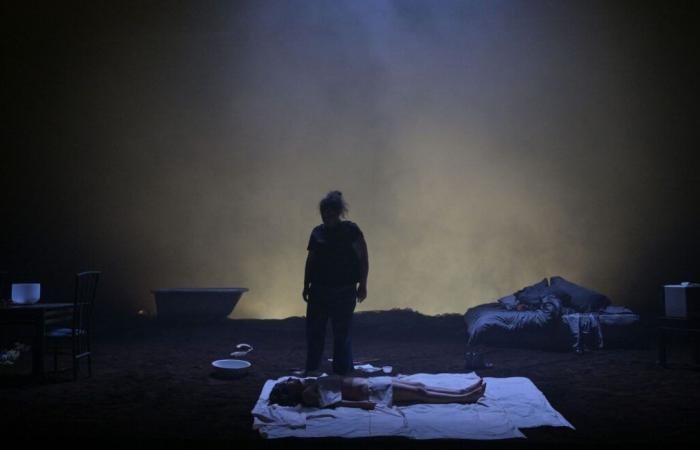After Geneviève Labelle and Mélodie Noël Rousseau, at the head of an invigorating queer rereading of the larger-than-life destiny of Joan of Arc, the new artistic director of Espace Go, Édith Patenaude, continues to focus on what the metropolis offers most stimulating in terms of feminist theater creation. These days, Krystel Descary and Marie-Ève Milot, respectively author and director of make deathdare to approach the most powerful of taboos with as much humor as sensitivity.
Perinatal or parasocial, individual or collective, serene or traumatic, romantic or animal, mourning is unavoidable. While we are still experiencing the repercussions of the pandemic, the challenges of medical assistance in dying, highlighted by Alain Gravel’s recent podcast, free deathinvite themselves into many discussions. Theater artists cannot be blamed for avoiding the question. FromFires at Duceppe in Iphigenia at the Denise-Pelletier theater via Snow in Abidjan at the Center du Théâtre d’Aujourd’hui, the Grim Reaper takes center stage almost everywhere. Marie-Ève Perron, who doesn’t do things by halves, recently devoted a solo piece to the inexhaustible subject, Of your strength to liveand a podcast, We’re all going to go through it.
Note that death on our stages is very often linked to questions of identity, a tendency to which Krystel Descary’s “documented autofiction” is no exception. Indeed, while questioning death, ours as well as that of our loved ones, the play also addresses the void left by those who have chosen to leave our lives. This is the situation in which Krystel, the heroine of make deathalter ego of the author, who tries with admirable determination to establish a link with her father, a man who repeatedly disappears from her life, thus exposing her to a succession of so-called “unrecognized” bereavements.
The piece juxtaposes two registers, two frames which will naturally meet at the very end. On the one hand, there is Krystel (finally a theater character worthy of the talent of Laetitia Isambert-Denis!), her mother, Michèle (the irresistible Isabelle Vincent) and Krystel’s best friend, Marie (the hilarious Joanie Martel), without forgetting Michel, the father who excels in the art of disappearing into thin air (Pier Paquette, skilled in this thankless role). On the other side, there is a thanadoula (played with solicitude by the author), a guide who provides wise advice. Gently, without imposing a path, without giving lessons, but without obscuring or embellishing reality, it teaches how to die as well as how to tame absence.
Above all, don’t think that the experience is depressing, quite the contrary. Firstly, because we laugh a lot, but also because the show is a beneficial ritual where the scenography by Geneviève Lizotte, the lighting by Étienne Boucher and the music by Mykalle Bielinski contribute to uplifting the soul. Using inventively a floor covered with earth, Marie-Ève Milot’s staging, as simple as it is effective, punctuated with references to the 1990s, easily takes us from the comic to the tragic, from the everyday to the spiritual, from the banal to the grandiose. The final scene, a poignant mortuary toilet which allows “mourning to begin to unfold in a concrete and sacred way”, is worth the trip alone.
As for the text by Krystel Descary, which benefited from the insights of Marie-Claude St-Laurent, its great originality lies in the way in which it presents a range of possibilities with regard to the causes and contexts of the death of the father and of the girl. We thus transcend the anecdote, we broaden the subject and we universalize what takes place on stage in order to offer everyone an adequate journey, an adapted reconciliation, a tailor-made appeasement.
To watch on video
Canada






